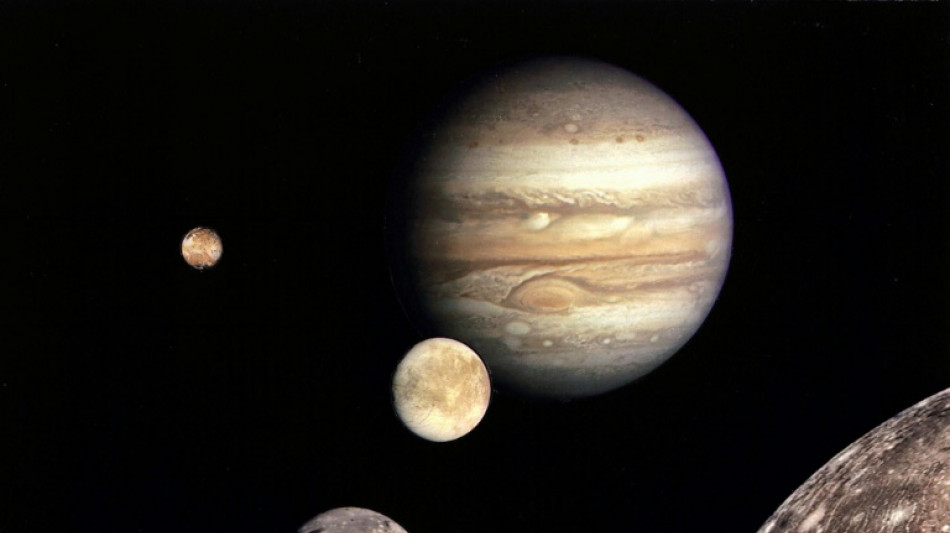
-
 Women sommeliers are cracking male-dominated wine world open
Women sommeliers are cracking male-dominated wine world open
-
Exhibition of Franco-Chinese print master Zao Wou-Ki opens in Hong Kong

-
 Myanmar junta denies killing civilians in hospital strike
Myanmar junta denies killing civilians in hospital strike
-
Why SpaceX IPO plan is generating so much buzz

-
 Thailand continues Cambodia strikes despite Trump truce calls
Thailand continues Cambodia strikes despite Trump truce calls
-
US envoy to meet Zelensky, Europe leaders in Berlin this weekend

-
 North Korea acknowledges its troops cleared mines for Russia
North Korea acknowledges its troops cleared mines for Russia
-
US unseals warrant for tanker seized off Venezuelan coast

-
 Cambodia says Thailand still bombing hours after Trump truce call
Cambodia says Thailand still bombing hours after Trump truce call
-
Machado urges pressure so Maduro understands 'he has to go'

-
 Best Gold Investment Companies in USA Announced (Augusta Precious Metals, Lear Capital, Robinhood IRA and More Ranked)
Best Gold Investment Companies in USA Announced (Augusta Precious Metals, Lear Capital, Robinhood IRA and More Ranked)
-
Leinster stutter before beating Leicester in Champions Cup

-
 World stocks mostly slide, consolidating Fed-fuelled gains
World stocks mostly slide, consolidating Fed-fuelled gains
-
Crypto firm Tether bids for Juventus, is quickly rebuffed

-
 Union sink second-placed Leipzig to climb in Bundesliga
Union sink second-placed Leipzig to climb in Bundesliga
-
US Treasury lifts sanctions on Brazil Supreme Court justice

-
 UK king shares 'good news' that cancer treatment will be reduced in 2026
UK king shares 'good news' that cancer treatment will be reduced in 2026
-
Wembanyama expected to return for Spurs in NBA Cup clash with Thunder

-
 Five takeaways from Luigi Mangione evidence hearings
Five takeaways from Luigi Mangione evidence hearings
-
UK's king shares 'good news' that cancer treatment will be reduced in 2026

-
 Steelers' Watt undergoes surgery to repair collapsed lung
Steelers' Watt undergoes surgery to repair collapsed lung
-
Iran detains Nobel-prize winner in 'brutal' arrest

-
 NBA Cup goes from 'outside the box' idea to smash hit
NBA Cup goes from 'outside the box' idea to smash hit
-
UK health service battles 'super flu' outbreak

-
 Can Venezuela survive US targeting its oil tankers?
Can Venezuela survive US targeting its oil tankers?
-
Democrats release new cache of Epstein photos

-
 Colombia's ELN guerrillas place communities in lockdown citing Trump 'intervention' threats
Colombia's ELN guerrillas place communities in lockdown citing Trump 'intervention' threats
-
'Don't use them': Tanning beds triple skin cancer risk, study finds

-
 Nancy aims to restore Celtic faith with Scottish League Cup final win
Nancy aims to restore Celtic faith with Scottish League Cup final win
-
Argentina fly-half Albornoz signs for Toulon until 2030

-
 Trump says Thailand, Cambodia have agreed to stop border clashes
Trump says Thailand, Cambodia have agreed to stop border clashes
-
Salah in Liverpool squad for Brighton after Slot talks - reports

-
 Marseille coach tips Greenwood as 'potential Ballon d'Or'
Marseille coach tips Greenwood as 'potential Ballon d'Or'
-
Draw marks 'starting gun' toward 2026 World Cup, Vancouver says

-
 Thai PM says asked Trump to press Cambodia on border truce
Thai PM says asked Trump to press Cambodia on border truce
-
Salah admired from afar in his Egypt home village as club tensions swirl

-
 World stocks retrench, consolidating Fed-fuelled gains
World stocks retrench, consolidating Fed-fuelled gains
-
Brazil left calls protests over bid to cut Bolsonaro jail time

-
 Trump attack on Europe migration 'disaster' masks toughening policies
Trump attack on Europe migration 'disaster' masks toughening policies
-
US plan sees Ukraine joining EU in 2027, official tells AFP

-
 'Chilling effect': Israel reforms raise press freedom fears
'Chilling effect': Israel reforms raise press freedom fears
-
Iran frees child bride sentenced to death over husband's killing: activists

-
 No doubting Man City boss Guardiola's passion says Toure
No doubting Man City boss Guardiola's passion says Toure
-
Youthful La Rochelle name teen captain for Champions Cup match in South Africa

-
 World stocks consolidate Fed-fuelled gains
World stocks consolidate Fed-fuelled gains
-
British 'Aga saga' author Joanna Trollope dies aged 82

-
 Man Utd sweat on Africa Cup of Nations trio
Man Utd sweat on Africa Cup of Nations trio
-
EU agrees three-euro small parcel tax to tackle China flood

-
 Taylor Swift breaks down in Eras documentary over Southport attack
Taylor Swift breaks down in Eras documentary over Southport attack
-
Maresca 'relaxed' about Chelsea's rough patch


Search for alien life extends to Jupiter's icy moons
Could vast, long-hidden oceans be teeming with alien life in our very own Solar System?
A new chapter in humanity's search for extraterrestrial life opens on Thursday as Europe's JUICE spacecraft blasts off on a mission to investigate the icy moons of Jupiter.
First discovered by Italian astronomer Galileo Galilei more than 400 years ago, these ice-covered moons are so far from the Sun that they were long dismissed as possible candidates to host life in our backyard.
Until recently, the Solar System's habitable zone was thought to "end at Mars", French astrophysicist Athena Coustenis, one of the scientific leads of the European Space Agency (ESA)'s JUICE mission, told AFP.
But NASA's Galileo probe to Jupiter in 1995 and the more recent Cassini spacecraft's trip to Saturn caused scientists to broaden their horizons.
The gas giant planets themselves were correctly ruled out, but their icy moons -- particularly Jupiter's Europa and Ganymede, and Saturn's Enceladus and Titan -- offered fresh hope of nearby life.
Under their icy surfaces are thought to be huge oceans of liquid water -- a crucial ingredient for life as we know it.
Nicolas Altobelli, a JUICE project scientist at ESA, said it would be "the first time that we explore habitats beyond the frost line" between Mars and Jupiter.
Beyond that line, temperatures plummet and "liquid water can no longer exist on the surface", Altobelli told AFP earlier this year.
- 'Gigantic' ocean -
The Jupiter Icy Moons Explorer (JUICE) mission launches from Europe's spaceport in Kourou, French Guiana on Thursday on an eight-year odyssey through space.
By July 2031 it will have entered Jupiter's orbit, from which it will probe Ganymede, Europa and fellow icy moon Callisto.
Then, in 2034, JUICE will enter the orbit of Ganymede, the first time a spacecraft has done so around a moon other than our own.
As well as being the largest moon in the Solar System, Ganymede is also the only one that has its own magnetic field, which protects it from dangerous radiation.
This is just one of several signs that Ganymede's hidden ocean could provide a stable environment for life.
Unlike similar missions to Mars, which focus on finding signs of ancient life long since extinguished, scientists hope Jupiter's icy moons will still be home to living organisms, even if only tiny or single-celled.
Such habitability requires a power source. Lacking energy from the Sun, the moons could instead take advantage of the gravity that Jupiter exerts on its satellites.
The force creates a process called tidal heating, which warms the interior of the moons and keeps their water liquid.
Ganymede's "gigantic" liquid ocean is trapped between two thick layers of ice dozens of kilometres beneath the surface, said Carole Larigauderie, JUICE project head at French space agency CNES.
"On Earth, we still find life forms at the bottom of the abyss," she added.
Tiny microbes such as bacteria and archaea have been found to be able to survive on Earth without sunlight, raising hopes that life elsewhere will be able to do the same.
As well as water and energy, life needs nutrients.
"The big question is therefore whether Ganymede's ocean contains" the necessary chemical elements, Coustenis said.
The ocean would need to be able to absorb the nutrients from anything that fell on the moon's surface, for example, which would eventually dissolve into the water, she added.
- Not alone -
JUICE's array of instruments will probe Ganymede's ocean to determine its depth, distance from the surface and -- hopefully -- its composition.
The ESA's 1.6 billion euro ($1.7 billion) probe will spend eight months orbiting Ganymede, getting as close as 200 kilometres (125 miles) from the moon, all while sheltered from radiation.
It will not be the only spacecraft lurking around Jupiter.
NASA's Europa Clipper mission is scheduled to launch in October next year. It will take a quicker path to Jupiter, arriving at Europa in 2030.
If one -- or more -- of Jupiter's moons ticks all the boxes to host life, the "logical next step" would be to send a mission to land on the surface, said Cyril Cavel, JUICE project manager at manufacturer Airbus.
Although there are no plans for such a mission, which could definitively prove the existence of life outside of Earth, "that's part of the dream," he said.
G.Stevens--AMWN

